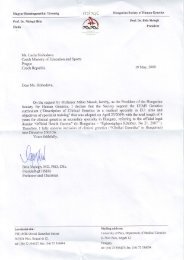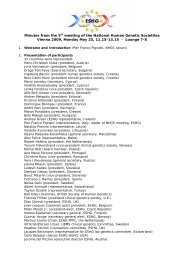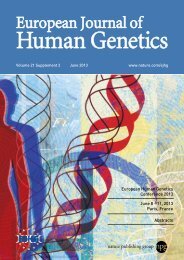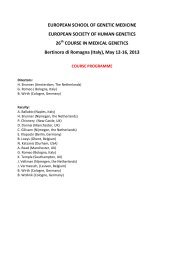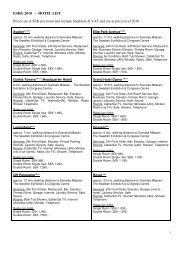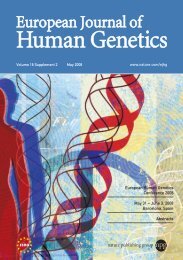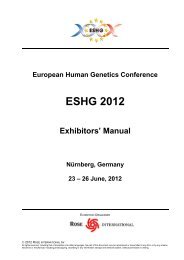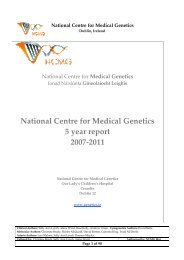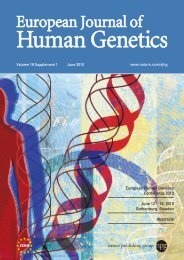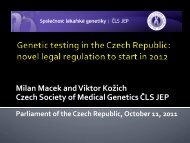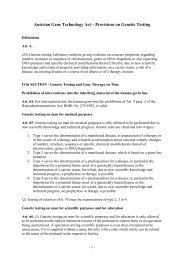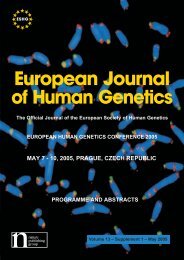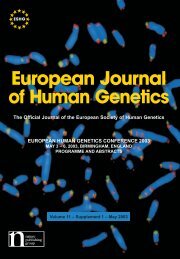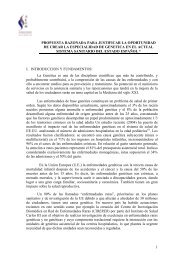2009 Vienna - European Society of Human Genetics
2009 Vienna - European Society of Human Genetics
2009 Vienna - European Society of Human Genetics
You also want an ePaper? Increase the reach of your titles
YUMPU automatically turns print PDFs into web optimized ePapers that Google loves.
Genetic counseling <strong>Genetics</strong> education, Genetic services, and Public policy<br />
tial impact for achievements <strong>of</strong> active longevity and creation most favorable<br />
conditions for maximal duration <strong>of</strong> individual life-span. Participation<br />
<strong>of</strong> major age-regulated genes such as «biological clock» genes<br />
and the «weak chain» genes (predisposing to different multifactorial<br />
diseases) in ageing <strong>of</strong> humans is outlined. The significance <strong>of</strong> genetic<br />
testing <strong>of</strong> allelic polymorphisms and marker-genes implicated in common<br />
multifactor disorders such as bronchial asthma, osteoporosis,<br />
trombophilia, endometriosis, diabetes and preeclampsis is reviewed.<br />
Major problems evoked by sophisticated genetic testing results interpretation<br />
are considered. Special attention is paid to Genome Wide<br />
Association Studies (GWAS) technology implemented for analysis <strong>of</strong><br />
genetic pr<strong>of</strong>iles and candidate genes associated with common diseases.<br />
Scientific problems and social interests in creation <strong>of</strong> individually<br />
oriented DNA-data banks (Gene Passes) amenable for the pregnant<br />
women, children, sportsmen, etc are discussed. The relationship <strong>of</strong><br />
Gene Pass concept to the current international genetic program <strong>of</strong><br />
«Perosonificated Genome» is highlighted. Feasible perspectives genetic<br />
testing and basic contribution <strong>of</strong> Gene Pass into gerontology<br />
practical medical service are reviewed.<br />
P01.19<br />
Orphanet UK and ireland, a growing Rare Disease resource<br />
I. Gomez Paramio1 , S. Aymé2 , H. Middleton-Price1 , D. Donnai1 ;<br />
1 2 The Nowgen Centre, Manchester, United Kingdom, ORPHANET-INSERM<br />
SC11, Paris, France.<br />
Orphanet (www.orpha.net) the largest international online resource for<br />
rare diseases involves 38 countries and lists >11500 pr<strong>of</strong>essionals.<br />
Orphanet features a comprehensive classification <strong>of</strong> rare diseases.<br />
Orphanet UK and Ireland was established in 2004 and has grown in<br />
depth, listing >2500 rare disease services and now featuring QA data<br />
and pr<strong>of</strong>essional networks.<br />
These cases show how patients, health pr<strong>of</strong>essionals and researchers<br />
benefit from Orphanet.<br />
Case 1: At 39 years Oliver started to bite his tongue without any apparent<br />
reason. He visited many pr<strong>of</strong>essionals until in 2008 he was diagnosed<br />
with Neuroacanthocytosis. Through Orphanet he learned about<br />
his disease. He also found a support group for Neuroacanthocytosis<br />
patients and a specialised clinic close to home.<br />
Case 2: Liz, a consultant specialising in lysosomal storage disorders,<br />
has a three month-old patient suffering from Gaucher disease type2.<br />
Through Orphanet she discovered a new orphan product based on a<br />
tartaric acid salt. She also learned about its potential benefits to treat<br />
this life-threatening disease due to its different mechanism <strong>of</strong> action in<br />
relation to other products.<br />
Case 3: Tom is a researcher involved in a project about rare types<br />
<strong>of</strong> Arthrogryposis, including Kalyanaraman syndrome. Tom uses Orphanet<br />
to learn about these syndromes, find relevant articles and other<br />
<strong>European</strong> research projects. He uses its multiple disease classifications<br />
to discover links with other very different diseases having similar<br />
symptoms.<br />
These cases highlight the importance <strong>of</strong> accessible and accurate information<br />
about rare diseases. They also illustrate the importance <strong>of</strong> a<br />
<strong>European</strong> approach to improve diagnosis, care and treatment.<br />
P01.20<br />
Unbalanced Offspring <strong>of</strong> Reciprocal translocation carriers:<br />
Genetic counseling and Ethical considerations<br />
F. I. Sahin, O. Ozer, Z. Yilmaz;<br />
Baskent University Faculty <strong>of</strong> Medicine Department <strong>of</strong> Medical <strong>Genetics</strong>, Ankara,<br />
Turkey.<br />
Genetic counseling is the process during which information is given<br />
about a genetic condition. On the basis <strong>of</strong> two unbalanced <strong>of</strong>fspring,<br />
ethical considerations and parental decisions during genetic counseling<br />
will be discussed.<br />
The first family had a baby with multiple congenital abnormalities and a<br />
karyotype 46,XY,der(14)t(1;14)(q42.1;q32.3)mat. Their major concern<br />
was the wellbeing <strong>of</strong> the child as the baby had growth retardation.<br />
The second family had a prenatally diagnosed fetus with a karyotype<br />
46,XX,ish der(3)t(3;13)(p22;q21)pat(wcp13+). The parents decided to<br />
continue the pregnancy.<br />
In the first case, parents did not know about the consequences <strong>of</strong> an<br />
unbalanced child as they did not have the opportunity to have a genetic<br />
counseling session before the baby was born. They accepted<br />
their child and were concerned about the prognosis <strong>of</strong> the baby. Second<br />
family had two counseling sessions, before and after diagnosis. In<br />
the first session, they were given information about the procedures to<br />
be performed, in the second; information about the unbalanced karyotype<br />
was given. They believed the child is healthy and stated they are<br />
ready for any difficulties to be encountered during lifetime <strong>of</strong> the child.<br />
Although, we <strong>of</strong>fered termination <strong>of</strong> the pregnancy as an option, we<br />
admired their decision.<br />
Genetic counseling sessions have three goals including; education<br />
and informing, providing support and help cope and facilitate informed<br />
decision making, need to be nondirective and patient relief is important.<br />
Social and educational facts as well as the practitioner’s attitude<br />
play role in making decision, which sometimes has priority on the mentioned<br />
scientific facts.<br />
P01.21<br />
Role <strong>of</strong> the family in genetic counselling for predictive testing <strong>of</strong><br />
late onset neurological diseases<br />
M. Paneque Herrera, M. Fleming, J. Sequeiros;<br />
IBMC, Porto, Portugal.<br />
The role <strong>of</strong> the family in genetic counselling for predictive testing <strong>of</strong><br />
late onset neurodegenerative diseases is a topic <strong>of</strong> growing interest<br />
and not yet sufficiently explored. Impact <strong>of</strong> involving the family in the<br />
dynamics <strong>of</strong> the predictive process remains quite unclear. The present<br />
longitudinal study aims at exploring the relationship between family<br />
and disease in the context <strong>of</strong> genetic counselling during pre-symptomatic<br />
testing (PST) for two neurodegenerative diseases: Spinocerebellar<br />
Ataxia Type 2 (SCA2) and Familial Amyloid Polyneuropathy<br />
ATTRV30M (FAP). For one year, we followed 35 subjects that carried<br />
out PST for SCA2 in Cuba and 28 subjects for FAP, in Portugal. It was<br />
shown that the family influences psychological behaviour <strong>of</strong> subjects<br />
requesting PST, starting from the decision making process down to<br />
the changed indicators <strong>of</strong> psychological wellbeing <strong>of</strong> those performing<br />
PST. After diagnosis, family functioning decreases regardless <strong>of</strong> the<br />
outcome, and the presence <strong>of</strong> the disease in the mother is associated<br />
with a greater disrupting effect <strong>of</strong> the disease in the family. In the<br />
future, additional short and long term longitudinal studies are essential,<br />
not just regarding the way in which the family influences genetic<br />
counselling process in predictive testing, but also on how the latter is<br />
influenced by the process <strong>of</strong> diagnosis.<br />
P01.22<br />
Process to incorporate genetic disease in the WHO international<br />
classification <strong>of</strong> diseases: tools managed by Orphanet<br />
S. Aymé, A. Rath, B. Bellet, M. Georget;<br />
ORPHANET, Paris, France.<br />
The current International Classification <strong>of</strong> Diseases (ICD10) has undergone<br />
a revision process which should lead to a release <strong>of</strong> ICD11 in<br />
2014. Most genetic diseases are absent in ICD10 and the ones having<br />
a specific code are <strong>of</strong>ten misclassified. As a consequence, morbidity<br />
and mortality due to genetic diseases is invisible in health information<br />
systems. To overcome this difficulty, Orphanet (www.orpha.net) has<br />
established a partnership with WHO to ensure a fair representation <strong>of</strong><br />
rare diseases in general. In order to prepare the proposal, Orphanet<br />
has collected all published expert classifications and established a database<br />
<strong>of</strong> phenotypes indexed with ICD10 codes, MIM codes, genes,<br />
mode <strong>of</strong> inheritance, age <strong>of</strong> onset, class <strong>of</strong> prevalence. Phenotypes<br />
are assigned to as many classification systems as necessary to represent<br />
them. The visualisation <strong>of</strong> the classification systems and <strong>of</strong> the<br />
place <strong>of</strong> each disease within the classifications is available on the Orphanet<br />
website. A Topic Advisory Group on rare diseases has been<br />
established to manage the revision process at WHO. The whole community<br />
<strong>of</strong> experts is going to be involved in the validation <strong>of</strong> the proposals<br />
prepared by Orphanet during the year to come. Information will<br />
circulate via OrphaNews Europe. The human genetics community is<br />
invited to take an active part as the results will condition the visibility <strong>of</strong><br />
all activities in the field.



